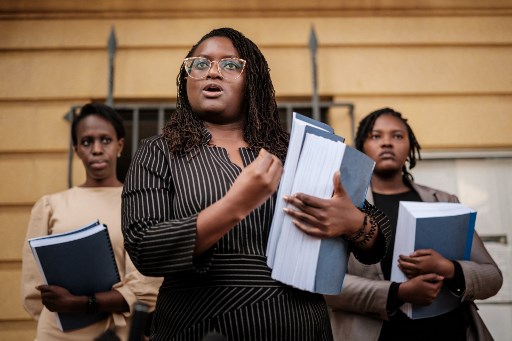
The case filed in Kenya’s High Court on Wednesday by two individuals and a rights group says Meta responded inadequately to hateful content on its platform, especially in relation to the war in Ethiopia’s northern Tigray region.
One petitioner said his father, an ethnic Tigrayan, had been targeted by racist messages on Facebook before his murder in November 2021, and the social media giant had failed to move quickly to remove these posts.
“If Facebook had just stopped the spread of hate and moderated posts properly, my father would still be alive,” said Abrham Meareg, who is also Tigrayan and an academic like his father.
“I’m taking Facebook to court so no one ever suffers as my family has again. I’m seeking justice for millions of my fellow Africans hurt by Facebook’s profiteering –- and an apology for my father’s murder.”
His lawyer, Mercy Mutemi, said Facebook took a month to respond to Abrham’s appeals for the content to be taken down.
“Why did it take over a month to take down a post that calls for the murder of somebody?” she said.
Mutemi said Facebook acknowledged the content violated community standards but a year later one of the violent posts was still online.
Another petitioner is Fisseha Tekle, an Ethiopian researcher for Amnesty International and a Tigrayan, who has written about the war and faced a torrent of online abuse.
The international community has condemned hate speech and dehumanising rhetoric during the two-year conflict, which has seen all sides accused of atrocities amid warnings of ethnic cleansing.
- ‘Inhumane’ working conditions –
Meta spokesperson Ben Walters said the company was yet to be served with the lawsuit, but had “strict rules which outline what is and isn’t allowed on Facebook and Instagram.”
“We’ve removed misinformation when there is a risk it may contribute to physical harm for a long time,” he told AFP in a statement.
“In Ethiopia, we have identified and are removing a number of pre-reviewed harmful claims and out of context imagery that make false allegations about the perpetrators, severity or targets of violence in Ethiopia.”
The Katiba Institute, a Kenyan rights group and another petitioner to the lawsuit, is seeking changes to Facebook’s algorithm.
Inciteful, hateful and dangerous posts “spark conversation, attract reactions and shares as well as motivate back-and-forth discussion in the comments section,” read the petition seen by AFP.
It also accused Meta of “inhumane” working conditions for its overstretched content moderators in Nairobi tasked with overseeing eastern and southern Africa, a vast region covering 500 million people.
The petitioners claim this resulted in “systematic discrimination” against African Facebook users, citing the platform’s swift response by comparison to the attack on the US Capitol by supporters of former US president Donald Trump on January 6, 2021.
The petitioners are asking the court for the establishment of a 200-billion Kenyan shillings ($1.6-billion) compensation fund for victims of hate and violence incited on Facebook.
In late 2021, Rohingya refugees sued Facebook for $150 billion, claiming the social network failed to stem hate speech directed against them.
The Rohingya, a mainly Muslim minority, were driven from Myanmar in 2017 into neighbouring Bangladesh by security forces in a crackdown now subject to a UN genocide investigation.
AFP is involved in a partnership with Meta providing fact-checking services in Asia-Pacific, Europe, the Middle East, Latin America and Africa.
sva/ho/np/amu/ri
© Agence France-Presse






